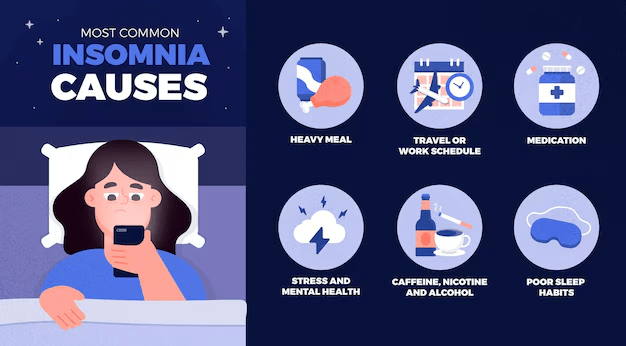The Importance of Sleep for Mental Health: Tips for Better Rest

Ever wonder how sleep deprivation impacts mental health? Are you feeling overwhelmed, anxious, or mentally drained? Discover why sleep is vital for your mind and explore practical tips to improve your rest and boost your mental well-being. Lets explore the importance of sleep for mental health here. How Sleep Impacts Mental Health Do you ever notice how a bad night’s sleep can leave you feeling off the next day? Maybe you’re cranky, anxious, or struggling to focus. It’s not just in your head—there’s a deep connection between sleep and mental health. In fact, the importance of sleep for mental health can’t be overstated. A lack of quality sleep can affect your mood, memory, and even lead to serious mental health conditions over time. So, what’s going on while we sleep that makes it so crucial for our brains? The Science Behind Sleep and Mental Well-Being Sleep isn’t just about rest; it’s a critical time for your brain to heal, recharge, and process information. While we sleep, the brain clears out toxins, balances hormones, and strengthens neural connections. Ever wonder how sleep deprivation impacts mental health? When you don’t get enough sleep, these processes get interrupted. Hormones like cortisol (the stress hormone) increase, while serotonin (the feel-good hormone) drops. Over time, this imbalance can lead to mood disorders like depression and anxiety. Plus, poor sleep makes it harder to cope with daily stressors, leading to a vicious cycle of sleeplessness and stress. Effects of Poor Sleep on Mental Health Consistently skimping on sleep does more than just make you feel groggy. Here’s how sleep impacts mental health in real terms: Increased Anxiety and Stress: Sleep deprivation can heighten anxiety levels, making you feel more stressed and irritable. Mood Swings: Lack of sleep can make you more emotionally reactive and less resilient to negative emotions. Impaired Cognitive Function: Struggling with decision-making, memory, and concentration? Poor sleep could be to blame. Increased Risk of Depression: There’s a well-established link between chronic sleep deprivation and depression. Not getting enough rest can deepen feelings of hopelessness or sadness. Worsened Symptoms of Mental Illness: For those already managing mental health conditions, poor sleep can make symptoms worse. How Quality Sleep Improves Mental Health On the flip side, getting enough quality sleep does wonders for your mental health. Here’s the importance of sleep for your mental health: Better Mood: A good night’s sleep helps regulate your emotions, making it easier to stay calm and happy. Improved Cognitive Function: You’ll think more clearly, make better decisions, and be more creative. Lower Stress Levels: Sleep reduces cortisol, helping you feel more relaxed and resilient to daily challenges. Enhanced Emotional Resilience: Well-rested people tend to handle stress better and bounce back from setbacks more quickly. Signs You’re Not Getting Enough Rest Are you sleep-deprived without realizing it? Many of us shrug off poor sleep, but it’s important to recognize the warning signs. Here’s how to know if you’re not getting enough rest: You’re Always Tired: Constant fatigue, no matter how much coffee you drink, is a big red flag. Moodiness: Feeling irritable, anxious, or depressed more often? Poor sleep could be the reason. Difficulty Concentrating: Struggling to stay focused or remember things? Your brain might be running on empty. Waking Up Often: If you wake up several times during the night, your sleep quality could be suffering. Relying on Naps or Caffeine: Do you feel the need for an afternoon nap or reach for caffeine to get through the day? Practical Tips for Better Sleep Now that you know how sleep impacts mental health, let’s look at some practical ways to improve your rest and support your mental well-being. Stick to a Sleep Schedule: Go to bed and wake up at the same time every day—even on weekends. Your body loves routine! Create a Relaxing Bedtime Routine: Take time to wind down before bed. Try reading, meditating, or taking a warm bath. Limit Screen Time Before Bed: The blue light from phones and laptops messes with your body’s natural sleep rhythms. Aim to unplug at least an hour before bed. Watch Your Diet: Avoid heavy meals, caffeine, and alcohol before bed. These can all interfere with sleep. Make Your Sleep Environment Cozy: A dark, quiet, and cool room can do wonders for your sleep quality. Get Regular Exercise: Physical activity during the day helps you fall asleep faster and enjoy deeper sleep. When to Seek Professional Help for Sleep Issues Sometimes, sleep problems go beyond the basics, and that’s okay. If you’ve tried everything and are still struggling, it might be time to seek professional help. If sleep deprivation is impacting your mental health or you suspect you have a sleep disorder, a sleep specialist or mental health professional can provide guidance. Here’s when to consider seeing a professional: You’ve been consistently unable to fall or stay asleep for more than a month. You wake up feeling exhausted, even after getting a full night’s sleep. Your sleep problems are affecting your mental health, relationships, or work performance. Conclusion: Prioritize Sleep for a Healthier Mind At the end of the day, the importance of sleep for mental health can’t be ignored. Sleep is essential for your emotional, cognitive, and overall mental well-being. By making sleep a priority and following the tips outlined here, you can significantly improve your mental health, mood, and quality of life. So, get cozy, unwind, and give your brain the rest it needs. You’ll thank yourself in the morning!
